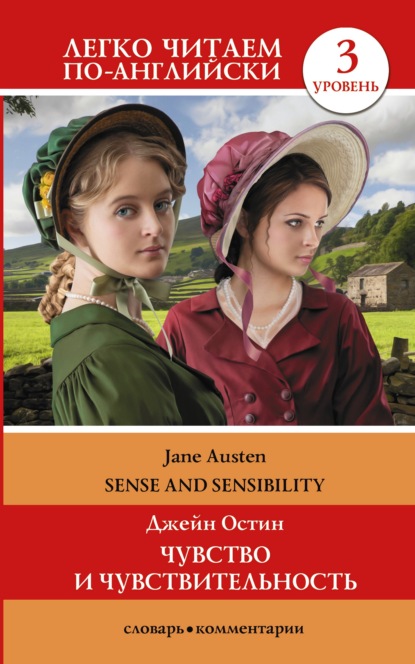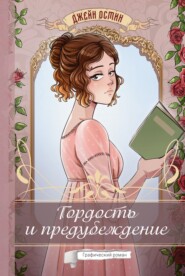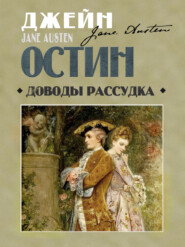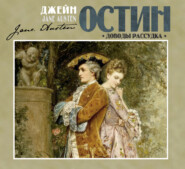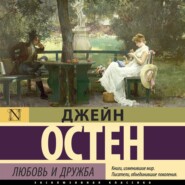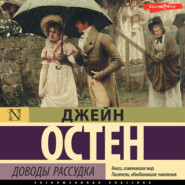По всем вопросам обращайтесь на: info@litportal.ru
(©) 2003-2025.
✖
Sense and Sensibility / Чувство и чувствительность. Уровень 3
Настройки чтения
Размер шрифта
Высота строк
Поля
Sir John invited them all to spend the next day at the park.
“Why do they ask us?” said Marianne, as soon as they were gone. “The rent of this cottage is low; but we have it on very hard terms, if we must dine at the park whenever anyone is staying either with them, or with us.”
Chapter XX
As the Dashwoods entered the drawing-room of the park the next day, at one door, Mrs. Palmer came running in at the other, merry as before. She took them by the hand, and expressed great delight.
“I am very glad to see you!” said she, seating herself between Elinor and Marianne, “We must go, for the Westons come to us next week, you know. I am so sorry we cannot stay longer; however we shall meet again in town very soon, I hope. I shall be quite disappointed if you do not. I can get the nicest house in the world for you, next door to ours, in Hanover Square. You must come, indeed.”
They thanked her; but refused.
“Oh, my love,” cried Mrs. Palmer to her husband, who just then entered the room, “you must help me to persuade the Miss Dashwoods to go to town this winter.”
Her love made no answer; and began complaining of the weather.
“How horrid all this is!” said he. “Such weather makes everything and everybody disgusting. Why does not Sir John have a billiard room in his house? Sir John is as stupid as the weather.”
Chapter XXI
The Palmers returned to Cleveland the next day, and the two families at Barton were again left to entertain each other. But this did not last long.
In Exeter, Mrs. Jennings met two young ladies, who were her relatives. This was enough for Sir John to invite them directly to the park. The young ladies arrived: their appearance was not unfashionable. Their dress was very smart, their manners very civil, they were delighted with the house, and in raptures with the furniture. Lady Middleton declared them to be very agreeable girls. Sir John went directly to the cottage to tell the Miss Dashwoods of Miss Steele and her sister’s arrival. They are the sweetest girls in the world! Sir John wanted the whole family to walk to the Park directly and look at his guests. Benevolent, philanthropic man!
“Do come now,” said he, “pray come – you must come – You can’t think how you will like them. Lucy is monstrous pretty, and so good-humoured and agreeable! The children are all hanging about her already. And they both want to see you, for they have heard at Exeter that you are the most beautiful creatures in the world. I have told them it is all very true, and a great deal more. You will be delighted with them I am sure.”
But Sir John did not prevail and only obtained a promise of their visit in a day or two, and then left them.
When their promised visit to the Park and consequent introduction to these young ladies took place, they found in the appearance of the eldest, who was nearly thirty, with a very plain and not a sensible face, nothing to admire. But in the other, who was not more twenty-two, they acknowledged considerable beauty. Her features were pretty, and she had a sharp quick eye, and a smartness of air. Their manners were particularly civil, and Elinor soon noticed that.
The vulgar freedom and folly of the eldest sister left her no recommendation, and as Elinor was not blinded by the beauty, or the shrewd look of the youngest, to her want of real elegance and artlessness, she left the house without any wish of knowing them better.
Not so the Miss Steeles. They came from Exeter to get new friends. Sir John was entirely on the side of the Miss Steeles. To do him justice, he did everything in his power to promote their unreserve.
Elinor did not suppose that Sir John would not laugh at her and Edward, as he did with respect to Marianne. Indeed it was his favourite joke of the two. In the eldest of Miss Steeles these jokes raised a curiosity to know the name of the gentleman.
“His name is Ferrars,” said Sir John, in a very audible whisper; “but pray do not tell it, for it’s a great secret.”
“Ferrars!” repeated Miss Steele; “Mr. Ferrars is the happy man, is he? What! your sister-in-law’s brother, Miss Dashwood? a very agreeable young man to be sure; I know him very well.”
“How can you say so, Anne?” cried Lucy. “Though we have seen him once or twice at my uncle’s, it is rather too much to pretend to know him very well.”
Elinor heard all this with attention and surprise.
“And who was this uncle? Where did he live? How came they acquainted?[13 - How came they acquainted? – Как они познакомились?]”
Chapter XXII
Marianne, who had never much toleration for impertinence, vulgarity, inferiority of parts, or even difference of taste from herself, was at this time particularly ill-disposed to be pleased with the Miss Steeles. Lucy missed no opportunity of engaging her in conversation by an easy and frank communication of her sentiments.
Lucy was naturally clever; her remarks were often just and amusing; and as a companion for half an hour Elinor frequently found her agreeable. But she was ignorant and illiterate; and her deficiency of all mental improvement, her want of information in the most common particulars, could not be concealed from Miss Dashwood, in spite of her constant endeavour to appear to advantage. Elinor saw the want of delicacy, of rectitude, and integrity of mind; and she could have no satisfaction in the company of a person who joined insincerity with ignorance.
“You will think my question an odd one, I dare say,” said Lucy to her one day, as they were walking together from the park to the cottage, “but are you personally acquainted with your sister-in-law’s mother, Mrs. Ferrars?”
Elinor did think the question a very odd one, and she answered that she had never seen Mrs. Ferrars.
“Indeed!” replied Lucy; “I wonder at that, for I thought you saw her at Norland sometimes. Then, perhaps, you cannot tell me what sort of a woman she is?”
“No,” returned Elinor; “I know nothing of her.”
“I am sure you think me very strange, for enquiring about her in such a way,” said Lucy; “but perhaps there may be reasons for that.”
Elinor made her a civil reply, and they walked on for a few minutes in silence. It was broken by Lucy, who renewed the subject again, with some hesitation,
“There is no occasion to trouble you, but I am sorry you do not know Mrs. Ferrars.”
“I am sorry I do not,” said Elinor, in great astonishment, “but really I never understood that you were at all connected with that family, and therefore I am a little surprised.”
“I dare say you are, and I am sure I do not at all wonder at it. But if I tell you all, you will not be so much surprised. Mrs. Ferrars is certainly nothing to me at present – but the time may come – how soon it will come must depend upon herself – when we may be very intimately connected.”
She looked down.
“Good heavens!” cried Elinor, “what do you mean? Are you acquainted with Mr. Robert Ferrars? Can you be?”
She did not feel much delighted with the idea of such a sister-in-law.
“No,” replied Lucy, “not to Mr. Robert Ferrars – I never saw him in my life; but,” fixing her eyes upon Elinor, “to his eldest brother.”
What felt Elinor at that moment? Astonishment and disbelief. She turned towards Lucy in silent amazement, unable to say anything. Though her complexion varied, she stood firm in incredulity.
“Why do they ask us?” said Marianne, as soon as they were gone. “The rent of this cottage is low; but we have it on very hard terms, if we must dine at the park whenever anyone is staying either with them, or with us.”
Chapter XX
As the Dashwoods entered the drawing-room of the park the next day, at one door, Mrs. Palmer came running in at the other, merry as before. She took them by the hand, and expressed great delight.
“I am very glad to see you!” said she, seating herself between Elinor and Marianne, “We must go, for the Westons come to us next week, you know. I am so sorry we cannot stay longer; however we shall meet again in town very soon, I hope. I shall be quite disappointed if you do not. I can get the nicest house in the world for you, next door to ours, in Hanover Square. You must come, indeed.”
They thanked her; but refused.
“Oh, my love,” cried Mrs. Palmer to her husband, who just then entered the room, “you must help me to persuade the Miss Dashwoods to go to town this winter.”
Her love made no answer; and began complaining of the weather.
“How horrid all this is!” said he. “Such weather makes everything and everybody disgusting. Why does not Sir John have a billiard room in his house? Sir John is as stupid as the weather.”
Chapter XXI
The Palmers returned to Cleveland the next day, and the two families at Barton were again left to entertain each other. But this did not last long.
In Exeter, Mrs. Jennings met two young ladies, who were her relatives. This was enough for Sir John to invite them directly to the park. The young ladies arrived: their appearance was not unfashionable. Their dress was very smart, their manners very civil, they were delighted with the house, and in raptures with the furniture. Lady Middleton declared them to be very agreeable girls. Sir John went directly to the cottage to tell the Miss Dashwoods of Miss Steele and her sister’s arrival. They are the sweetest girls in the world! Sir John wanted the whole family to walk to the Park directly and look at his guests. Benevolent, philanthropic man!
“Do come now,” said he, “pray come – you must come – You can’t think how you will like them. Lucy is monstrous pretty, and so good-humoured and agreeable! The children are all hanging about her already. And they both want to see you, for they have heard at Exeter that you are the most beautiful creatures in the world. I have told them it is all very true, and a great deal more. You will be delighted with them I am sure.”
But Sir John did not prevail and only obtained a promise of their visit in a day or two, and then left them.
When their promised visit to the Park and consequent introduction to these young ladies took place, they found in the appearance of the eldest, who was nearly thirty, with a very plain and not a sensible face, nothing to admire. But in the other, who was not more twenty-two, they acknowledged considerable beauty. Her features were pretty, and she had a sharp quick eye, and a smartness of air. Their manners were particularly civil, and Elinor soon noticed that.
The vulgar freedom and folly of the eldest sister left her no recommendation, and as Elinor was not blinded by the beauty, or the shrewd look of the youngest, to her want of real elegance and artlessness, she left the house without any wish of knowing them better.
Not so the Miss Steeles. They came from Exeter to get new friends. Sir John was entirely on the side of the Miss Steeles. To do him justice, he did everything in his power to promote their unreserve.
Elinor did not suppose that Sir John would not laugh at her and Edward, as he did with respect to Marianne. Indeed it was his favourite joke of the two. In the eldest of Miss Steeles these jokes raised a curiosity to know the name of the gentleman.
“His name is Ferrars,” said Sir John, in a very audible whisper; “but pray do not tell it, for it’s a great secret.”
“Ferrars!” repeated Miss Steele; “Mr. Ferrars is the happy man, is he? What! your sister-in-law’s brother, Miss Dashwood? a very agreeable young man to be sure; I know him very well.”
“How can you say so, Anne?” cried Lucy. “Though we have seen him once or twice at my uncle’s, it is rather too much to pretend to know him very well.”
Elinor heard all this with attention and surprise.
“And who was this uncle? Where did he live? How came they acquainted?[13 - How came they acquainted? – Как они познакомились?]”
Chapter XXII
Marianne, who had never much toleration for impertinence, vulgarity, inferiority of parts, or even difference of taste from herself, was at this time particularly ill-disposed to be pleased with the Miss Steeles. Lucy missed no opportunity of engaging her in conversation by an easy and frank communication of her sentiments.
Lucy was naturally clever; her remarks were often just and amusing; and as a companion for half an hour Elinor frequently found her agreeable. But she was ignorant and illiterate; and her deficiency of all mental improvement, her want of information in the most common particulars, could not be concealed from Miss Dashwood, in spite of her constant endeavour to appear to advantage. Elinor saw the want of delicacy, of rectitude, and integrity of mind; and she could have no satisfaction in the company of a person who joined insincerity with ignorance.
“You will think my question an odd one, I dare say,” said Lucy to her one day, as they were walking together from the park to the cottage, “but are you personally acquainted with your sister-in-law’s mother, Mrs. Ferrars?”
Elinor did think the question a very odd one, and she answered that she had never seen Mrs. Ferrars.
“Indeed!” replied Lucy; “I wonder at that, for I thought you saw her at Norland sometimes. Then, perhaps, you cannot tell me what sort of a woman she is?”
“No,” returned Elinor; “I know nothing of her.”
“I am sure you think me very strange, for enquiring about her in such a way,” said Lucy; “but perhaps there may be reasons for that.”
Elinor made her a civil reply, and they walked on for a few minutes in silence. It was broken by Lucy, who renewed the subject again, with some hesitation,
“There is no occasion to trouble you, but I am sorry you do not know Mrs. Ferrars.”
“I am sorry I do not,” said Elinor, in great astonishment, “but really I never understood that you were at all connected with that family, and therefore I am a little surprised.”
“I dare say you are, and I am sure I do not at all wonder at it. But if I tell you all, you will not be so much surprised. Mrs. Ferrars is certainly nothing to me at present – but the time may come – how soon it will come must depend upon herself – when we may be very intimately connected.”
She looked down.
“Good heavens!” cried Elinor, “what do you mean? Are you acquainted with Mr. Robert Ferrars? Can you be?”
She did not feel much delighted with the idea of such a sister-in-law.
“No,” replied Lucy, “not to Mr. Robert Ferrars – I never saw him in my life; but,” fixing her eyes upon Elinor, “to his eldest brother.”
What felt Elinor at that moment? Astonishment and disbelief. She turned towards Lucy in silent amazement, unable to say anything. Though her complexion varied, she stood firm in incredulity.
Вы ознакомились с фрагментом книги.
Приобретайте полный текст книги у нашего партнера:
Приобретайте полный текст книги у нашего партнера:





